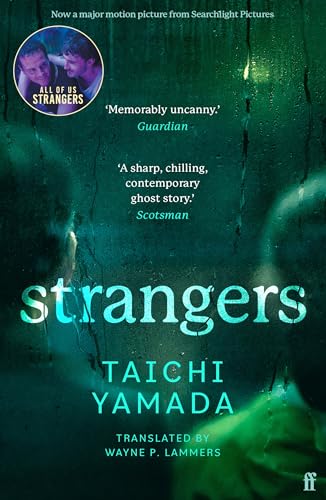Books: ‘Strangers’ by Taichi Yamada is a Simple Yet Haunting Ghost Story

The infamous words of cursed pirate Captain Barbossa, “You best start believing in ghost stories Ms. Turner… Cause you’re in one!” echoed through my head as I read Strangers by Taichi Yamada. Written back in 1987 and translated by Wayne P. Lammers in 2003, Strangers explores grief and the impact it has on someone decades after their initial loss. However, this isn’t your mother’s tale of grief and loss, but instead, a haunting read centered around the grief of a child, the loss of some parents, and the ghost that haunts us if we never learn to grieve and move on.
With such a strong message of a universal concept, wrapped in an appealing supernatural package, it makes sense that Strangers would eventually make its way to the silver screen. Initially adapted as a Japanese horror film, The Discarnates (1988), a new take on the novel has started to roll out around the globe. All of Us Strangers, branded as a British romantic fantasy film, began its limited release in the United States on December 22 and is expected to be released in the U.K. on January 26. With this new adaptation, it’s the perfect time to look back on Yamada’s Strangers and the impact it has on this most recent film.
[Warning: Spoilers from Strangers by Taichi Yamada are below!]
Life isn’t quite what Hideo would like in Strangers
When Strangers begins, it’s safe to say that life isn’t exactly what our narrator Hideo Harada had expected it would be. At 47 years old, he’s gone through some major life changes in like blink of an eye. Recently divorced, at his own request, Hideo lives in an apartment with no contact from his former life, including his son. He initially appears unbothered by this self-imposed isolation, but it isn’t long into the story before cracks begin to show.
Adding to the sense of loneliness and isolation is the set-up of Hideo’s apartment building. Usually, what comes to mind is a building bustling with people, living their lives separately but together. However, Hideo’s building is set up as offices and not residences. During the day, the building is crowded with people, but by night, he is alone and isolated in the empty structure. However, there is another who lives in his building as well, Kei.
Kei is significantly younger than Hideo, a fact that is beat over the reader’s head multiple times. His relationship with Kei screams midlife crisis, although it begins when Kei seeks him out for companionship. At first, Hideo rejects Kei, but with time, he begins to enjoy his time with Kei and the relationship that blossoms from both of their loneliness. This relationship is sprinkled throughout the nearly 200 pages of Strangers, in between the main narrative of Hideo and his parents.

A story about a grown child and his ghost parents
One night when left to his own accord, Hideo finds himself in his old stomping ground, the neighborhood he grew up in, when he stumbles into a club of sorts. It’s at this club that he runs into a man who looks exactly like his father. However, that’s impossible, his father died when he was a young child. Both of his parents did, for that matter, so how is it possible they both seem alive and well decades later?
Through repeated visits with these two doppelgängers, Hideo attempts to understand what’s going on. But as he continues to get increasingly sick with each visit, time is limited and every moment with his parents is precious. How far is Hideo willing to go for more time with two people he loves more than anything?
Strangers deep dives into these topics of grief and how much hurt someone can feel their entire lives after losing someone they lost. However, the book also provides a few twists and turns, embracing the supernatural aspects of the genre, ending with a different story than the one it sets out to be.
The positives and negatives of Strangers
For someone who loves reading, translated novels are something I tend to struggle with. While it’s not true for every translated text I’ve read, there are many I’ve read that aren’t great. The main message tends to hold true, but the energy and substance tends to lack, lost in translation. They feel dry and matter-of-fact, and it feels more like reading an academic text than a work of fiction. However, this feeling didn’t exist in Wayne Lammer’s translation of Yamada’s Strangers.
The novel itself isn’t long, it’s perhaps one of my quickest reads of 2023, with a cohesive story that is tight from start to finish. Everything that is required for an enjoyable story is there, without all the fluff that so many horror or fantasy novels have nowadays. And yet, with just the basic shell of the story, Yamada and Lammer paint a beautiful tale with a supernatural flair. The translation reads almost poetically at times, conveying so much with so little, moving me at times.
The core story between a boy and his parents is something I deeply connect with, as I’m sure so many others will as well. While I have not lost my parents, the idea of such a day feels harrowing. I could easily imagine the grief of a child who has lost his parents at such a young age. Overcoming that seems impossible, hanging over someone like a ghost.
Strangers uses this concept, creating actual ghosts that come back to haunt Hideo when he’s an adult. It explores perfectly what someone in his position would do, and I can’t argue that I wouldn’t make the same decisions as him.
Could I walk away knowing my parents are out there? I don’t think so, even if it meant watching myself fade away. However, Strangers also provides a healing experience for both Hideo and the reader. It showcases how difficult it is to stop chasing the ghosts that hang over you. I could feel the pain and relief that Hideo experiences as he grows, which again is a testament to Yamada and Lammer’s work.
I was hooked from the first page and remained so until the novel began to reach its conclusion. There’s a twist late in the book, which I began to see rather early on, but couldn’t figure out how it was connected to the deeper narrative. However, this simple twist, which reveals itself in the last 20 or so pages, completely changes the story, possibly negatively impacting it. No longer is it a story about the loss of a parent and the impact of grief, instead it became about revenge. It felt that Strangers wanted to be a last-minute horror novel, when it’s really more aligned with a family drama with supernatural elements.
The late-stage change left me confused and took Strangers down from a perfect novel to a good book. I think there was more to say about grief and loss, which was sacrificed for horror elements over the substance that most of Strangers provides.
Final thoughts on Strangers by Taichi Yamada
Overall, I’m glad I read this novel, which provided much of what I was looking for, even if it didn’t stick the landing. Reading Strangers made me even more excited for All of Us Strangers, which took the essence of what made this novel good and adapted it to be more representative of our time.
If you’re looking to get a good sense of the source material before seeing the film in Theaters, Strangers is a satisfying enough read that is easily digestible for readers of all types.
My Rating: 8/10
Have you read Strangers by Taichi Yamada? Let us know on social media @mycosmiccircus or in The Cosmic Circus Discord if you plan on reading this novel or checking out the film All of Us Strangers (in theaters now!). See our review of the film adaptation linked below.



